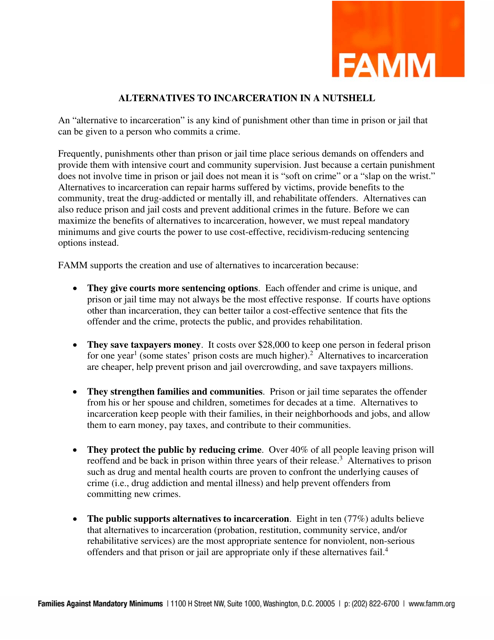Alternatives to Incarceration in a Nutshell - Families Against Mandatory Minimums
Alternatives to Incarceration, in a nutshell, is a program advocated by Families Against Mandatory Minimums (FAMM). The goal is to provide different options to traditional imprisonment for nonviolent offenders. These alternatives focus on rehabilitation, such as probation, parole, community service, drug treatment programs, and restorative justice, as a way to address the underlying issues that lead individuals to commit crimes. The aim is to reduce recidivism rates and help individuals reintegrate into society successfully.
FAQ
Q: What are alternatives to incarceration?
A: Alternatives to incarceration are programs and policies that aim to address underlying issues that contribute to criminal behavior, such as substance abuse or mental health problems, through means other than imprisonment.
Q: What are some examples of alternatives to incarceration?
A: Examples of alternatives to incarceration include probation, parole, house arrest, electronic monitoring, drug or mental health treatment, community service, restorative justice programs, and diversion programs.
Q: Why are alternatives to incarceration important?
A: Alternatives to incarceration are important because they can be more effective in reducing recidivism rates, provide individuals with the opportunity to rehabilitate and reintegrate into society, and cost less than imprisonment.
Q: Do alternatives to incarceration work?
A: Research has shown that certain alternatives to incarceration, such as drug treatment programs and mental health diversion programs, can be effective in reducing recidivism rates and improving outcomes for individuals.
Q: Are alternatives to incarceration commonly used?
A: The use of alternatives to incarceration varies across jurisdictions, but they are becoming more widely recognized and utilized as a means to address over-incarceration and promote rehabilitation.
Q: Are alternatives to incarceration only for non-violent offenders?
A: While some alternatives to incarceration are specifically designed for non-violent offenders, there are also programs and policies that can be used for individuals convicted of violent offenses, depending on the circumstances.
Q: Who supports alternatives to incarceration?
A: Many criminal justice reform advocates, organizations like Families Against Mandatory Minimums, and policymakers support the use of alternatives to incarceration as a more effective and humane approach to addressing crime.




























